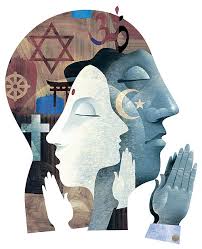Twenty-Sixth Sunday in Ordinary Time
“What is your opinion? …. Tax collectors and prostitutes are entering the kingdom of God before you.” Matt. 21:30
“What is your opinion?”
Today’s Gospel begins with a question – a question asked by Jesus himself. Amazingly enough, he seems to want feedback! He wants to know, not just what the leaders of the Temple back then thought, but what you and I think right now.
So, what is your opinion?
What do you think about this story that he proceeds to tell about the two sons who are sent out to work in a vineyard?
Here’s what I think: you and I are both of these sons.
At times we’re people who say all the right things, follow all the right rules, profess a belief in all the most important ideas about God and church, and present ourselves as upstanding citizens to all who can see. At other times, we change our minds and find ourselves slipping into behaviors that imply a denial of all that we profess to believe.
In other words, we’re the “Yes, sir” people who then “did not go.”
Sometimes.
At other times, we’re the people who resist what we know to be the right thing to do, the “I will not” person of today’s Gospel who “afterwards changed his mind and went.”
So, my opinion is: we’re a mix.
Sometimes we say one thing and do another. Other times we refuse to do the right thing, but then repent and seek forgiveness.
The question, then, that Jesus is ultimately asking each of us in today’s Gospel is:
Do you “talk the talk,” or do you “walk the walk”? Do you act out what you believe, or is it all words?
Again, for most of us, it’s probably a little of both.
I will take the risk and express still another opinion of mine.
It is this: where you and I stumble the most is precisely in the area that Jesus keeps emphasizing over and over and over. Our biggest failings are our attitudes and behaviors toward the very people Jesus claims will be “first” in the kingdom of God – the people who the Jewish leaders at that time considered “unclean;” the people they believed should be avoided at all costs, ignored, dismissed from the Temple, and viewed as “impure.”
Two millennia later from the time in which this Gospel was written, these very same people are the ones we still tend to designate as “impure”: the homeless, the mentally ill, the heroin addicts, the imprisoned, the immigrants, the impoverished.
And yet, these are the very ones Jesus embraced; the very ones he dined with; the very ones he allowed to wash his feet with their tears and dry them with their hair; the very ones he touched with his own hands; the very ones he healed; the very ones he told us would be “first” in the kingdom of God.
How can this be? Why would Jesus choose them? What is it about them that is so important?
After all, most of us would have the opinion that we’re the hard working ones; we’re the ones who have demonstrated will power and obedience to the authorities and strength of character – and all those other qualities that make for good citizens and loyal church goers.
Perhaps the opinion of St. Paul in the poignantly beautiful second reading from Philippians we read today will suggest an answer to these questions:
“Have in you the same attitude that is in Christ Jesus … Who emptied himself taking the form of a slave.”
All the people listed in the Gospel by Jesus as being “first” are those who are power-less, “emptied” people. They are people who have been brought to their knees by terrible hardship even to the point of being forced to take the “form of a slave.”
But, here’s the surprise:
What little they do have in their lives is the very thing Jesus is most looking for – room for God. They now have space for the Spirit to become operative so that true transformation can take place.
The Franciscan writer, Richard Rohr, has this opinion:
“Until you bottom out and come to the limits of your own fuel supply, there is no reason for you to switch to a higher octane of fuel …. You will not learn to actively draw upon a Larger Source until your usual resources are depleted and revealed as wanting. In fact, you will not even know there is a Larger Source until your own resources fail you.”
Bill W, one of the founders of Alcoholics Anonymous, has a similar opinion:
“It is the imperial ego that has to go, and only powerlessness can do the job correctly.”
This was also the opinion of Jesus.
He knew that the people most open to the reality of God, the people most pre-disposed to radical change in their lives were those who had nothing to lose. They were people who were not just hungry, but starving for liberation, for freedom from oppression. He knew also that these people were the ones who most resembled his own self-emptying process: his by his own choice, theirs by all the hardships and tragedies life had handed them.
To put it still another way, Jesus had the passionate opinion that we all must die twice in life: the first time to our egos. That’s what Jesus means when he tells us we must all take up our cross and carry it. He’s talking about dying to that part of ourselves that refuses to be transformed, that part of us that sounds a lot like the son in today’s Gospel reading who initially says “I will not.”
In the end, though, my opinion is that the best opinion of all is that of St. Paul:
“Have in you the same attitude that is also in Christ Jesus … who emptied himself taking the form of a slave.”
What’s your opinion?
Ted Wolgamot, Psy.D.
NOTE: Here’s the opinion of the Scripture scholar, Fr. Jose Pagola, concerning this scripture passage:
“What did Jesus see in those men and women, despised by everyone? Perhaps he saw their humiliation. A heart more open to God, more in need of forgiveness. Maybe it was their greater understanding of and nearness to the last and the least of society. Or because they were less proud and arrogant than the scribes and chief priests.
Jesus goes precisely to the most discriminated people. He sits down to eat with publicans. He lets a sinner kiss his feat. He touches lepers with his hands. He seeks to save ‘the lost.’ People call him ‘a friend of sinners.’ He keeps saying provocatively that ‘the last will be first,’ and that the publicans and prostitutes will go ahead of the scribes and priests on the way to the reign of God.
Jesus says that the only thing God wants is a life of dignity and happiness for his sons and daughters, starting now. Yet, so often our life as Christians seems to be cut into two parts. We organize and live our everyday life the way everyone else does. On Sundays we set aside some time to worship a God whom we never see during the rest of the week.
Let us be aware that what we believe is not what we say with our lips, but what we express with our whole lives.”



